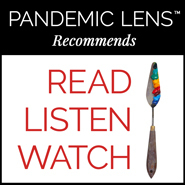PL Recommends: #3
By Linda Bennett | October 13, 2020
 This week we focus on…poignant creations of children who, although separated by oceans, share common feelings of loneliness and isolation…innovative ways to experience art and culture during the pandemic…and how Native American artists are lending their skills to COVID-19 public health campaigns. Then a podcast takes you to Colorado, where you’ll learn about a unique partnership between the Community Foundation Boulder County and KGNU Community Radio to create diversity in arts and culture and support artists decimated by COVID. Finally, watch the TED Talk featuring Brooklyn Museum Director Anne Pasternak, who helps us understand how museums need to re-examine the way in which they tell stories about history and culture in order to become inclusive of diverse perspectives that reflect and chronicle today’s real world.
This week we focus on…poignant creations of children who, although separated by oceans, share common feelings of loneliness and isolation…innovative ways to experience art and culture during the pandemic…and how Native American artists are lending their skills to COVID-19 public health campaigns. Then a podcast takes you to Colorado, where you’ll learn about a unique partnership between the Community Foundation Boulder County and KGNU Community Radio to create diversity in arts and culture and support artists decimated by COVID. Finally, watch the TED Talk featuring Brooklyn Museum Director Anne Pasternak, who helps us understand how museums need to re-examine the way in which they tell stories about history and culture in order to become inclusive of diverse perspectives that reflect and chronicle today’s real world.
Quote of the Week
“Before I used to draw abstract, but now I draw the reality of what is going on.”
—Cristofer Lucas Reyes, age seven, from Havana, Cuba
READ
In Pictures: Children Around the World Display their Lockdown Art
Douglas Broom, Senior Writer, Formative Content
World Economic Forum
See how children ages four through 14 express their feelings during isolation. From missing friends, grandparents, family experiences and school, to feeling sad and lonely, youth from around the world depict the universal loss of part of their childhood through their art. As a grandparent, I am so angry that children are being robbed of the joy of just being a child, growing, playing, and learning, of this precious time of wonder that can never be regained.
How to Experience Art & Culture During Coronavirus
Artwork Archive
This article beckons us to experience art in a different way. COVID has been the impetus for the creation of virtual experiences to keep us engaged and enriched. And many of these resources are offered free, a definite plus. So let’s take advantage of this effort and transport ourselves to some spectacular museums in London, Paris, Amsterdam, LA, Brazil and other places. Here I discovered Museo de Arte de Ponce in Puerto Rico. To my surprise and delight I found an exhibition of Pre-Raphaelite Lord Frederic Leighton’s work and one of my favorite paintings, ”Flaming June.” () Delicate sheer orange drapes envelope June in repose, and I got lost thoughtful narrative that examines the painting pictorially as well as historically—June was literally lost and then found. Intrigued? Visit and be amazed!
Native Artists Lend Skill to COVID-19 Campaigns
Sandra Hale Schulman
Indian Country Today
With so many Native communities severely affected by COVID, Native artists are creating colorful, eye-catching work to spread the word about masks and social distancing through printed posters at community centers, Instagram, online art and national shows. Artist Brent Learned’s “Masked Chief” depicts a traditional leader in profile wearing ceremonial regalia and a surgical mask. Artist Klee Benally messages “Solidarity not Charity,” urging community volunteers to provide greatly needed food, masks, and supplies to the most vulnerable within their communities. These powerful images reflect Native artists’ commitment and call for social action during this crisis.
LISTEN
Art and Culture During COVID-19 – An Industry Decimated by the Pandemic
TRENDS: Boulder Community Foundation + KGNU
Learn about a unique partnership between the Community Foundation Boulder County and KGNU radio to create diversity in arts and culture in Boulder. Focusing on artists of color, many of whom cannot afford to live in the affluent, primarily white, city of Boulder, the community is coming together to support artists devastated by the loss of jobs and income due to COVID. Listen to artists tell their stories about their struggles as well as their commitment to bringing awareness of social inequities to the community at large.
WATCH
The transformative role of art during pandemic
Anne Pasternak, Director, Brooklyn Museum
Anne Pasternak provides a thoughtful presentation about the role of museums now and going forward, their responsibility to remain truly public democratic institutions open to all and to engage with art and learn, heal, and discover in a safe space. She discusses how museums must abandon the traditional interpretation of history and culture from a white colonial perspective and instead include diverse points of view and present a different and expanded narrative. During this time of upheaval, the arts are more important than ever as historical referents that preserve stories of unimaginable loss of life, the communities affected, the reality of racial injustice and prejudice, the truth of what we are experiencing and how we are anticipating the future. She wants museums “to come back strong.”
Copyright © 2020 Linda Bennett
Linda Bennett has been a museum docent for 10 years, most recently focusing on engaging Adults with Memory Loss with works of art at the University of Michigan Museum of Art. In addition she has earned two graduate degrees (Master of Science and Master of Public Health) from the University of Michigan.